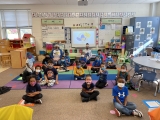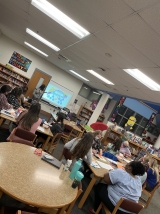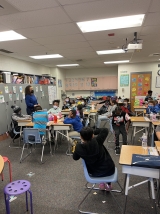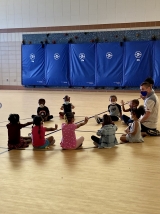-
Category 2
Selected in 2021
-
Grades: pre k - 5
School Setting: urban
Town Population: 0
Student Enrollment: 598
Student Demographics:
Black/African American: 73%
Teacher/Student Ratio: 1:20
White/Caucasian: 3%
Hispanic: 14%
Hawaiian/Pacific Islander: 0%
Asian: 3%
Native American: 0%
Other: 7%
% Reduced Lunch: 55%
% ELL Learners: 5%
Founded: 1994 -
PRINCIPAL:
Brian King -
CONTACT:
4800 Lancaster Circle
Waldorf, MD 20602
301-645-9053
bking@ccboe.com
Barnhart Elementary School
Waldorf, MD
The Barnhart team strives to create a safe, welcoming, supportive environment for all students."
- 1. Tell us about your school’s success.
- Barnhart has demonstrated excellence in serving special populations of English Learners (EL), thus meeting the criteria for Category 3. We were able to realize significant overall improvement in EL student achievement data. Additionally, we were able to close the gap between achievement data for EL when compared to other student groups. Equity at the school is centered around the notion that each learner will receive the necessary resources they need to thrive in school. To improve outcomes for the EL student group, we analyzed data from the county assessments, as well as school-based assessments, to identify opportunities for growth. We worked with key stakeholders, including parents and central office staff, to create a common goal and action plan.
- 2. Talk about the greatest contributing factor(s) that promoted positive change in your school.
- The greatest contributing factor to our success was the willingness of all stakeholders to commit to a common goal of improving the achievement levels of EL. Stakeholders included classroom teachers, members of the instructional leadership team, the county ESOL and Title I offices, school-based administrators, and parents/guardians. Input from each stakeholder was invited and valued at each stage of the process. This team approach was the greatest contributing factor to our success.
- 3. How has ESEA funding supported the school's success?
- ESEA funding supported the acquisition of resources for teachers to use with students in the classroom. ESEA funding was also used to provide stipends for teacher planning and collaboration. It was also used to provide stipends for teachers to access professional development opportunities. Teachers were able to engage in planning sessions so grade levels teams could unpack instructional standards with the Instructional Leadership Team (ILT), and experience peer coaching. In the area of math, Title I funds were used to purchase evidence-based math intervention like Do the Math Adding/Subtracting, Do the Math Fractions, Bridges Math Intervention, DreamBox and Reflex Math. In addition, Title I funds were used to purchase a variety of manipulatives for classroom use so that EL students had concrete hands-on materials. ESEA funds were also used to pay tutors to work with EL during the school day to address specific skill gaps.
- 4. What professional development activities were used to improve teaching and learning?
-
Classroom teachers received professional development instructional best practices for ESOL instruction. This on-going professional development focuses on reading strategies, vocabulary development, math content knowledge, new instructional programs, diversity training, culturally responsive teaching strategies, OGAP (On-Going Assessment Project), and FAME (Formative Assessment for Maryland Educators). Staff participated in the professional development opportunities provided by the Office of World Languages/ESOL which included Modifications for EL students, Applied Linguistics, What's Different About Teaching Reading to EL students, and Newcomer EL students. At the school level, the ESOL teacher provided professional development to the Barnhart staff on the WIDA levels and the instructional implications of students at each level. A peer coaching model was used to allow teachers to observe one another and share instructional best practices.
- 5. Talk about the cultural shift leading up to your school's success.
- School culture is based on high expectations for effort and participation from all stakeholders, including students, families, and school staff. The Barnhart team strives to create a safe, welcoming, supportive environment for all students. There was not a cultural shift to this position, it had always been the culture of the school. We continue to believe that we have an ethical and moral responsibility to ensure students receive an education that provides an optimal learning environment that leads them to be prepared to pursue their individual talents and dreams.
- 6. How has community involvement strengthened your success?
- Increased family engagement for EL students also had a positive impact on students at Barnhart. EL families were provided translated school materials, as well as translators at all school events. Additionally, resources were identified and provided for at-home use. Barnhart parents were truly supportive of the school and community. Parents attended events and teachers were accessible to parents. Parents regularly attended events which encouraged their input in the decision-making process. These events included Parent Advisory Council meetings, DADvisory Council, informal before-school Croissants and Conversations with the principal, school-wide Title I evening events, and Saturday workshops. The Parent Liaison facilitated family engagement and opportunities for parents and families to participate in their child(s) education. Holding before, during and after-school activities provides all parents with an opportunity to participate in the events that best fit their schedule.
Stats
-
Category 2
Selected in 2021
-
Grades: pre k - 5
School Setting: urban
Town Population: 0
Student Enrollment: 598
Student Demographics:
Black/African American: 73%
Teacher/Student Ratio: 1:20
White/Caucasian: 3%
Hispanic: 14%
Hawaiian/Pacific Islander: 0%
Asian: 3%
Native American: 0%
Other: 7%
% Reduced Lunch: 55%
% ELL Learners: 5%
Founded: 1994 -
PRINCIPAL:
Brian King -
CONTACT:
4800 Lancaster Circle
Waldorf, MD 20602
301-645-9053
bking@ccboe.com






